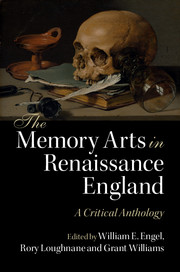Book contents
- Frontmatter
- Dedication
- Contents
- List of figures
- Acknowledgements
- A note on abbreviations
- Introduction
- PART I The art of memory
- PART II Rhetoric and poetics
- PART III Education and science
- PART IV History and philosophy
- PART V Religion and devotion
- PART VI Literature
- Introduction to Part VI
- POETRY
- PLAYS AND PROSE
- VI.11 Thomas Nashe, The Unfortunate Traveller (1594)
- VI.12 William Shakespeare, selected works
- VI.13 John Webster, selected works
- VI.14 Thomas Tomkis, Lingua: or the Combat of the Tongue (1607)
- VI.15 Mary Wroth, Urania (1621)
- VI.16 John Earle, Microcosmography (1628)
- VI.17 John Jones, Adrasta (1635)
- VI.18 Thomas Browne, Hydriotaphia, Urn-Burial (1658)
- VI.19 Anon., Crackfart and Tony; or, Knave and Fool (1680)
- VI.20 John Bunyan, The Pilgrim's Progress (1681)
- Index
- References
VI.19 - Anon., Crackfart and Tony; or, Knave and Fool (1680)
from PLAYS AND PROSE
Published online by Cambridge University Press: 05 August 2016
- Frontmatter
- Dedication
- Contents
- List of figures
- Acknowledgements
- A note on abbreviations
- Introduction
- PART I The art of memory
- PART II Rhetoric and poetics
- PART III Education and science
- PART IV History and philosophy
- PART V Religion and devotion
- PART VI Literature
- Introduction to Part VI
- POETRY
- PLAYS AND PROSE
- VI.11 Thomas Nashe, The Unfortunate Traveller (1594)
- VI.12 William Shakespeare, selected works
- VI.13 John Webster, selected works
- VI.14 Thomas Tomkis, Lingua: or the Combat of the Tongue (1607)
- VI.15 Mary Wroth, Urania (1621)
- VI.16 John Earle, Microcosmography (1628)
- VI.17 John Jones, Adrasta (1635)
- VI.18 Thomas Browne, Hydriotaphia, Urn-Burial (1658)
- VI.19 Anon., Crackfart and Tony; or, Knave and Fool (1680)
- VI.20 John Bunyan, The Pilgrim's Progress (1681)
- Index
- References
Summary
About the text
In the autumn of 1678 an alleged Catholic conspiracy to assassinate Charles II and massacre Protestants was revealed. The uncovered ‘Popish Plot’ was supposed to be a conspiracy to reinstitute the Catholic faith in England. Although later discovered to be the fabrication of Titus Oates and Israel Tonge, the revelation of the regicidal plot created a new wave of anti-Catholic sentiment. The anonymous prose dialogue Crackfart and Tony parodies a popular pamphlet Citt and Bumpkin (1680), written by the royalist author Roger L'Estrange (1616–1704). L'Estrange's work, principally a conversation between Citt, a London citizen, and Bumpkin, a country naïf, attacks in part Republican opportunism. Citt and Bumpkin meet in an alehouse and discuss the means by which they can exploit the fall-out from the ‘Popish Plot’ to further the ambitions of the parliamentary cause.
The arts of memory
Following the Restoration, ‘An Act of Free and General Pardon, Indemnity, and Oblivion’ was passed in the new Convention Parliament. With this Act, Charles II granted pardon to the supporters of Oliver Cromwell and to those indirectly involved in the execution of his father, Charles I (those who had directly officiated over the execution were not granted the same pardon). The Act pardoned ‘treasons and other offences…since 1st Jan. 1637’. Remarkably, this Act also included a provision that penalised any persons who revived ‘the memory of late differences’ for three calendar years. In theory, this was a legally sanctioned act of collective forgetting; in practice, this meant that if anyone spoke about the causes for, and fall-out from, the Civil War and Interregnum, they would receive a fine, £10 for a gentleman, 40s for anyone below that rank. In this excerpt, Dick says that Tom must ‘get the Art of Memory’ to constantly remind people about the execution of Charles I, banishment of Charles II, and the worst aspects of the Interregnum. Ironically, he says that Tom should intentionally misremember; although most wicked acts were committed by but ‘a few’, he should lay blame on all those of the Presbyterian faith. In attesting to the genuine danger of the ‘Popish Plot’ and overall Jesuitical mission, the satirical work attacks those royalists who remain sympathetic to the Catholic cause.
- Type
- Chapter
- Information
- The Memory Arts in Renaissance EnglandA Critical Anthology, pp. 352 - 356Publisher: Cambridge University PressPrint publication year: 2016



